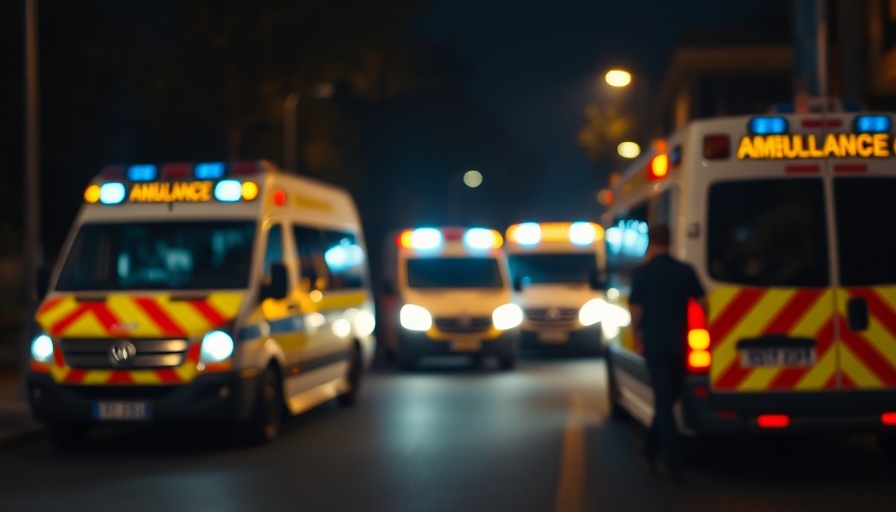
Understanding the Attack: A Tragic Incident in Gaza
On March 23, 2023, an incident in Rafah, Gaza, shocked the international community when Israeli soldiers killed fifteen unarmed medics and rescue workers. Eyewitness footage and subsequent investigations revealed that despite the victims being clearly marked as emergency responders, multiple soldiers opened fire for a harrowing six minutes. This report aims to shed light on the events that unfolded, highlighting the distressing implications of this attack and examining the broader context of the conflict.
The Unfolding Tragedy: A Detailed Account
At approximately 5 a.m., two Red Crescent medics, Asaad al-Nasasra and Rifaat Radwan, set out to search for missing colleagues after an earlier attack had resulted in fatalities. Their journey taking them through a dangerous landscape now littered with the fallout of recent violence, they received no response from their peers for over an hour. The grim discovery came swiftly—Israeli soldiers had already targeted their crew, killing two medics in the process.
As they searched, a sequence of events escalated dramatically. Rifaat captured the chaos on his phone, which has since become a pivotal piece of evidence. With the video synched to various recordings from the site, analysts have reconstructed the assault, revealing a shocking disregard for the lives of the medics, who were identifiable by their uniforms and flashing emergency lights.
Breaking Down the Response: Eyewitness Testimonies
The aftermath of the attack exposed a deeply unsettling reality; not only were the medics deliberately fired upon, but they also remained under attack while critically injured and praying for their lives. Witness accounts underline the confusion and fear that filled the air, noting that there was a clear absence of any immediate threat posed by the emergency workers. A survivor, Munther Abed, recounted harrowing details of his detention and the severe treatment he faced after the chaos.
Experts in international law have condemned the actions of the Israeli forces, asserting that attacking medical personnel constitutes a serious breach of the laws of war. Such sentiments echo throughout the global community as calls for accountability grow.
The Context of Violence: Background of the Conflict
Days preceding this heartbreaking incident, Israel had violated a cease-fire agreement following the collapse of negotiations with Hamas concerning hostages. This set the stage for increased military action in Gaza. Ground troops moved into Rafah prepared for confrontation, establishing ambush points along critical evacuation routes. The perception that medics and ambulances are shielded spaces of safety was crushed when they were suddenly deemed part of a perceived Hamas threat.
The narrative from the Israel Defense Forces (IDF) suggesting that they mistook emergency vehicles for militant transports has raised serious questions. Critics argue that it reflects a lack of proper military engagement protocols and empathy towards civilian lives caught in conflict.
Legal and Ethical Implications: A Call for Justice
The deaths of fifteen emergency responders not only highlight a specific incident of military aggression but also challenge the moral fabric underpinning contemporary warfare. International humanitarian law expressly prohibits attacks on those engaged in humanitarian missions. The need for an impartial investigation is paramount, as the ramifications extend beyond the immediate victims to the very essence of how conflicts are conducted in urban environments.
Amid growing international scrutiny, the IDF admitted to operational failures in response to the public outrage following the attack. However, such admissions raise further questions: how can accountability be ensured in future operations? And what safeguards are needed to protect humanitarian workers in conflict zones?
Conclusion: The Future of Humanitarian Protection in Conflict Zones
This incident serves as a pivotal example of how essential it is to examine the treatment of medical personnel on the frontlines of humanitarian crises. The importance of establishing robust protocols that protect these essential workers cannot be overstated. The heart-wrenching deaths of medics should resonate far beyond the borders of Gaza, prompting international bodies to advocate for stronger protections for emergency responders globally.
As we delve deeper into the implications of this tragedy and seek to understand its roots in the ongoing conflict, we must advocate for change. An appeal for a more humane approach to warfare calls for our collective action to ensure that medical professionals are afforded the respect and protection they deserve. The world cannot afford another tragedy like this.”
 Add Row
Add Row  Add
Add 




 Add Row
Add Row  Add
Add 

Write A Comment